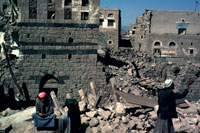Workshop on Seismicity and Earthquake Engineering in the Extended Mediterranean Region

- © UNESCO/B. Rouhban
26 - 29 October 2009 at the Luso-American Foundation
Lisbon, Portugal
The workshop on Seismicity and Earthquake Engineering in the Extended Mediterranean Region will be hosted by the lnstituto Dom Luiz and the Luso-American Foundation, and sponsored by the United Nations Educational, Scientific and Cultural Organization (UNESCO) and the U.S. Geological Survey (USGS).
Approximately 60 senior scientists from approximately 20 countries and the Palestinian Authority, in the extended Mediterranean region are invited to participate in the workshop that will be held 26 - 29 October 2009 at the Luso-American Foundation.
UNESCO and the USGS have been working with the Council of Europe, government agencies, and other organizations on a program for Reducing Earthquake Losses in the Extended Mediterranean Region (RELEMR). Twenty-eight RELEMR meetings have been held since the first meeting in Cairo in 1993 and during the last seven years workshops have been hosted by the Jordan Natural Resources Authority and Royal Scientific Society, the Kandilli Observatory and Earthquake Research Institute and the Middle East Technical University in Turkey, the Cyprus Geological Survey Department, the lnstitute of Earth Sciences 'Jaume Almera' in Spain, and the Technical University of Crete, Greece.
At these meetings, participants discussed regional approaches to improve seismic data (e.g., more accurate locations and improved magnitude estimates), probabilistic seismic hazard assessment (PSHA), engineering issues (e.g., reasons for building failures), and the production of a RELEMR seismicity map has also been discussed. Participants produced a ground shaking map of the Dead Sea region and training courses in PSHA, HAZUS, David Boore's Ground Shaking and other software have been given.
This workshop will feature special sessions on the Technical Methodology and Applications of the HAZUS-MH Earthquake Loss Estimation Model, the Protection of Historical Sites in the Extended Mediterranean Region and Open Source Software as well as sessions for General Presentations in seismology, geology and earthquake engineering.
This workshop will contribute to the reduction of earthquake losses and we have the opportunity to contribute to the health and safety of the millions of people on the extended Mediterranean region.
Related links:
:: Agenda [.pdf]
:: Logistic information [.pdf]
:: Fundaçao Luso-Americana website
For further information please contact:
:: Jair Torres, Section for Disaster Reduction, Natural Science Sector, Tel: +33 (0)1 45 68 41 22, Fax: +33 (0)1 45 68 58 21
- Source:UNESCO SC
- 20-10-2009

